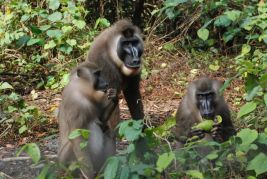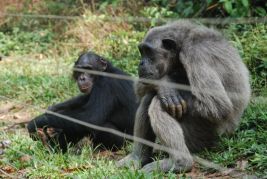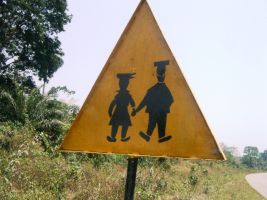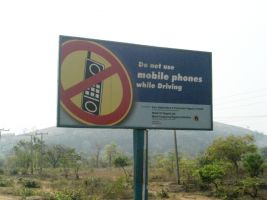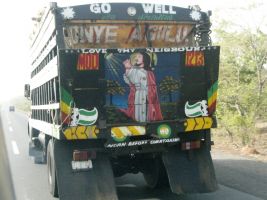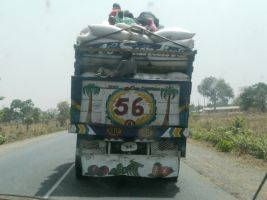
 Italia
Italia France
France Spain
Spain Morocco
Morocco Mauritania
Mauritania Senegal
Senegal Mali
Mali Burkina
Burkina Ghana
Ghana Togo
Togo Benin
Benin Nigeria
Nigeria Cameroon
Cameroon Gabon
Gabon Sao Tomè
Sao Tomè Gabon 2
Gabon 2 Congo
Congo Congo DCR
Congo DCR Angola
Angola Namibia
Namibia Sud Africa
Sud Africa Namibia 2
Namibia 2 Botswana
Botswana Zimbabwe
Zimbabwe Botswana 2
Botswana 2 Sud africa 2
Sud africa 2 Swaziland
Swaziland Mozambico
Mozambico Malawi
Malawi Tanzania
Tanzania Rwanda
Rwanda Uganda
Uganda Kenya
Kenya Etiopia
Etiopia Sudan
Sudan Egitto
Egitto Libia
Libia Tunisia
Tunisia Malta
Malta
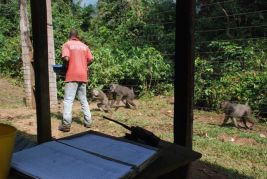
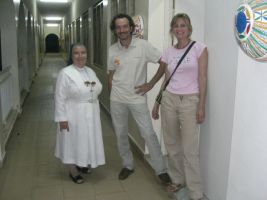
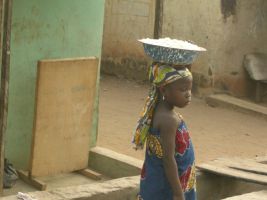
Nigeria, here we are! 24 Feb. 2008
We enter through the Chikanda border. The police are polite and waste no time processing our documents. They also give us a Health check, whereby we have to show them our health cards and all relevant vaccination certificates. They also make sure we are not carrying any fresh food, including fruit and vegetables… Then we go to the customs office, the officers here are also very polite, but not very quick… First a customs officer jots down all our details - vehicle, personal, where we have been and where we are going. He then shows us with great pride, a second booklet, which he tells us he will use to re-write all our information. He then takes particular pride in pointing-out and reading out other travellers details that he has entered since 2002. In total, we spend an hour with him; it is just as well we are not in a hurry. Aside from this, entering through this border was a relatively painless experience.
We are told that there is a hotel an hour away, so we leave in search of it.
Kossobusso Guest House
Guest House? This place is not very clean, has no running water, no electricity and there is a communal toilet. The room costs 300 Naira, less than 2 euros; this includes a candle and a bucket of dirty water from the nearby well.. We pay for the room, but we sleep in our tent.
We would recommend this place only if you have your own water. The house is surrounded by a wall, is secure and it is the only one across the border. GPS N09°33.165’ E003°13.684’
Tomorrow, we have 700 km waiting for us with over 150 of hard track!
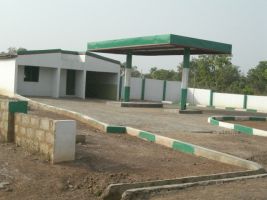
Running with time – 25 Feb. 2008
By 6:50 a.m., we are ready to leave. It takes us three and a half hours to cover the first 77km; the road surface is horrendous, littered with deep potholes. The next 100km is just as bad. The average speed is 20kph. Then finally, we find ourselves on a better road. On this one, there are many tankers travelling at a very high speed. As they try to avoid the biggest potholes, they pay little or no attention to other vehicles, as if they have the right of way!
There are many petrol stations, but most are closed; we found only two open during the 700km we covered. In addition, the price of fuel was a staggering 120 naira/l instead of the average 90! Then, we ask ourselves, if all these petrol stations are closed, then where do all these tankers fill up?
The day is long and hot. We get to Abuja at 8p.m. after 13 hours of uninterrupted journey. As luck has it, we know an Italian chap called Mauro who is working here. We call him, whereby he kindly invites us to dinner. We meet-up outside the Sheraton Hotel, a renowned meeting point for many over-landers that go through the city.
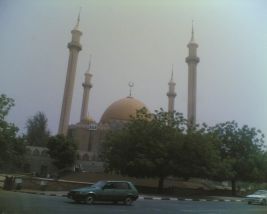
Abuja – 26 Feb. 2008
We begin our search for the offices where we can apply for our visas and soon find the office of the High Commissioner that issues tourist visas. A good start!
GPS N09°04.283’ E007°29.381’
We are asked for everything: car insurance - this was taken out in Cameroon but now we are in Nigeria!, copies of the Carnet De Passages, vehicle details, passports, vaccination certificates the lot… They also want to see a copy of our visas for Nigeria, I try to explain that the police officials we saw this morning checked and passed our documentation and found no problems, hence the very reason we are able to be here, painstakingly going over procedures that make no sense; there is no connection between the visa to Nigeria and the one to Cameroon no matter how much you try to make one.
The up-shot of all this, is simply wherever you go in Africa, apart from plenty of patience, take plenty of photocopies of your documents. Anyway, everyone is polite and after paying 14000 Naira each (the equivalent of 85 euros), we eventually have our visas in a day (the most expensive visas so far!).
Angola
GPS N09°04.283 E007°29.929’
We are told on the telephone that they cannot issue visas to non-Nigerian residents. However, we know that it has been done in the past for English over-landers.
We persist with our request for a few days, but even with the support of some influential friends, the result is negative. Very politely, they deny our requests and invite us to apply for visas in the villages near the Angolan border. Rules are rules….
Gabon
Polite and full of smiles, but it will take three days to obtain the visas. We cannot wait that long, our Nigerian Visas are too short and will not cover this period of time. It would cost 10.500 Naira each (60 euros), two pictures and copies of our passports.

…Michelin, Michelin, wherefore art thou…?
After some eight tyre repairers, a tyre market and a whole morning spent in search of the cheerful, chubby little chap and his Michelin XZL tyres, we are unable to find them. So, we abandon the search and decide to try our luck in Cameroon where the roads are muddier…
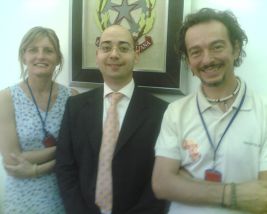
Nice ice-cream – 28 Feb 2008
We are guests of the Italian Ambassador Massimo Baistrocchi, a true adventurer. We spend a very pleasant evening, hosted by Mr Nico Longo, the Nigerian vice Ambassador. Exquisite dinner, excellent company and wonderful homemade ice cream to finish off, delicious!
THANK YOU – Abulia Feb. 2008
There are people whose door is always open.
There are people you warm to and connect with from the start.
There are people with a wealth of experience.
There are people who delight and enchant you with tales of their adventures.
There are people whose selflessness and readiness to help are second nature.
There are people who amaze you with their generosity.
There are people who are a paragon and an inspiration to us all.
There are people you miss the moment you wave them goodbye.
There are people, people like Mauro.
Chaos in Cameroon – 29 Feb. 2008
Whilst in Abujia, we learn through a local newspaper, that there is disorder in some Cameroon cities. In the capital Douala, increases in the price of bread and some types of fuel have caused some rioting against the opposing English speaking Southerners. Scuffles with the police have also been reported… we hope that by the time we get there that the trouble will have eased-off.
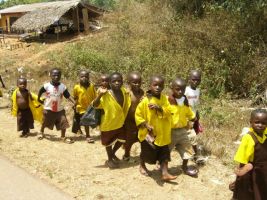
Kaduna - 1 March 2008
We go to Kaduna, 200km north of the capital. The Italian ambassador has told us about a school that is host to 500 children; we decide to pay a visit. Nazareth School is a centre run by Nun Samira e Nun Concepita. Elfoavventure slogan says, “If culture grows, peace will grow”; we have discovered this to be very true in Africa.
Helping to support schools on this Continent is vital. In just a few years, these dedicated missionary nuns with the help of donations from all over the world have created a formidable and efficient educational centre. We leave an Elfo token. All details in the solidarity section.
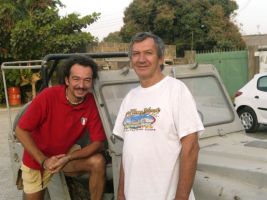
In the same village, we meet Gianni from Emilia Romagna; he is an expert on Africa and Land Rovers. He helps us check the front CV joints. Everything seems to be in order.
Our search for our Michelin XZL tyre continues, we find an XCL, unfortunately, this is a tyre that is pre-Punic Wars and extremely expensive; the search continues...
Gianni invites us to his house where we enjoy a lovely dinner. Thank you Gianni.
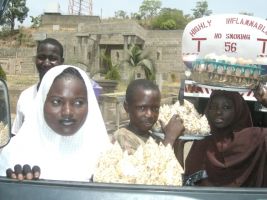
South! South!
By dawn, we are up and heading South. We want to cover the 800km to Drill Ranch situated in the mountains bordering Cameroon before sunset. The road is long but in good condition and as we make our way, the change in surroundings is interesting and dramatic. From the dry arid northern landscape to the lush tropical south and all the shades in between, from shale to increasingly dense forest that gradually becomes jungle.
The quality of the road starts to deteriorate and it is difficult to judge how the conditions of this final stretch will be. As rain begins to fall, our fears rise as to what lies ahead and if we still have a chance of arriving before what is left of the daylight disappears completely. The rain gets heavier, the black clouds thicker and the daylight darker. Further more, to add insult to injury, we lose time when we have to change a wheel… but, it has to be said, a pit stop worthy of Ferrari pit technicians.
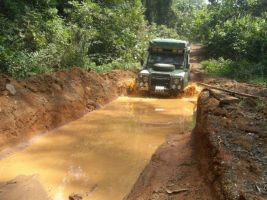
After 15km of wet, slippery muddy conditions, we arrive at a junction and take a dirt road N06°14.250’ E009°01.456’. Our journey is at an end and we arrive at the ranch under a torrent of tropical rain. The place is captivating, a place worth spending more time
Drill Ranch N06°17.950’ E008°59.888’
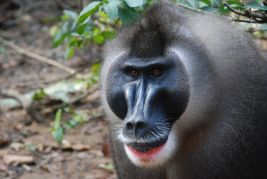
The next day the rain has stopped and we wake to the sounds of the tropical forest. On my way to take a shower, I notice some strange movements in the forest. I take a closer look and to my delight, I can see a tranquil group of mandrills, males, females and little ones. After breakfast, we explore our surroundings further, where we see hundreds of rare mandrills… here they receive protection and are given propagation and re-integration programs.
We are also greeted by some lively stone throwing chimpanzees; for these chimps, this place is a mixture between an orphanage and a retirement home, they cannot go back to the wild. We decide to leave a small Elfo contribution. Full details in the solidarity section.
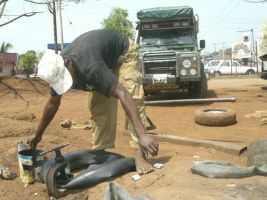
Ikom – 3rd March 2008
Next day our Visas expire… we reach Ikom, where we stop to repair an inner-tube and fill-up before we reach the more expensive Cameroon. We sleep at the Lisbon Hotel in an infernal heat GPS N05°57.631’ E008°43.590’
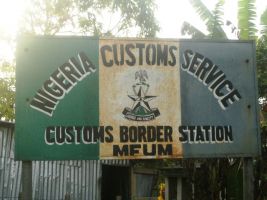
Farewell Nigeria – 4 March 2008
We are faced with an array of different roadblocks as we travel towards the frontier; some are guarded, some unguarded, others are makeshift with a rope or just some wooden planks and some spikes on the floor. Some have military guards, some with people in civilian clothes but all holding machine guns. However, despite the uneasy feelings, we do not have any problems nor are we asked for money. No problems even crossing the Mfun border. Everyone is polite and friendly.
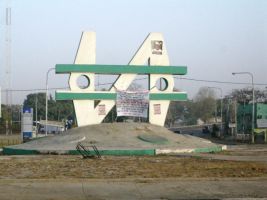
Our impressions
Nigeria has wealth, but is a place where its resources are in the hands of a few. Smart practice brings prosperity to businesses and this powerful minority. Racketeering and its protagonists thrive, reaping the rewards whilst rubbing shoulders with the local politicians. Corruption is now part and parcel and with the states attentions elsewhere, the most essential services such as water, light, fuel and communication are left neglected, leaving many without.
The majority of Nigerians aspire to be part of this system; because of the rudimentary nature of it, they have little or no choice if they want to earn a living, even if this sometimes means the use of violence and intimidation.
Overall, our experience has been quite positive. We came across many roadblocks but we were never hassled, nor were any illicit requests for money made. We have deliberately avoided the Southern part of the country where the situation is slightly different; reports of bandits and the kidnapping of white people are commonplace. This contrasts completely from the centre-north, where you can still travel in relative safety. Although, we did decide not to travel around after dark, but this fear of ours is probably exaggerated.
